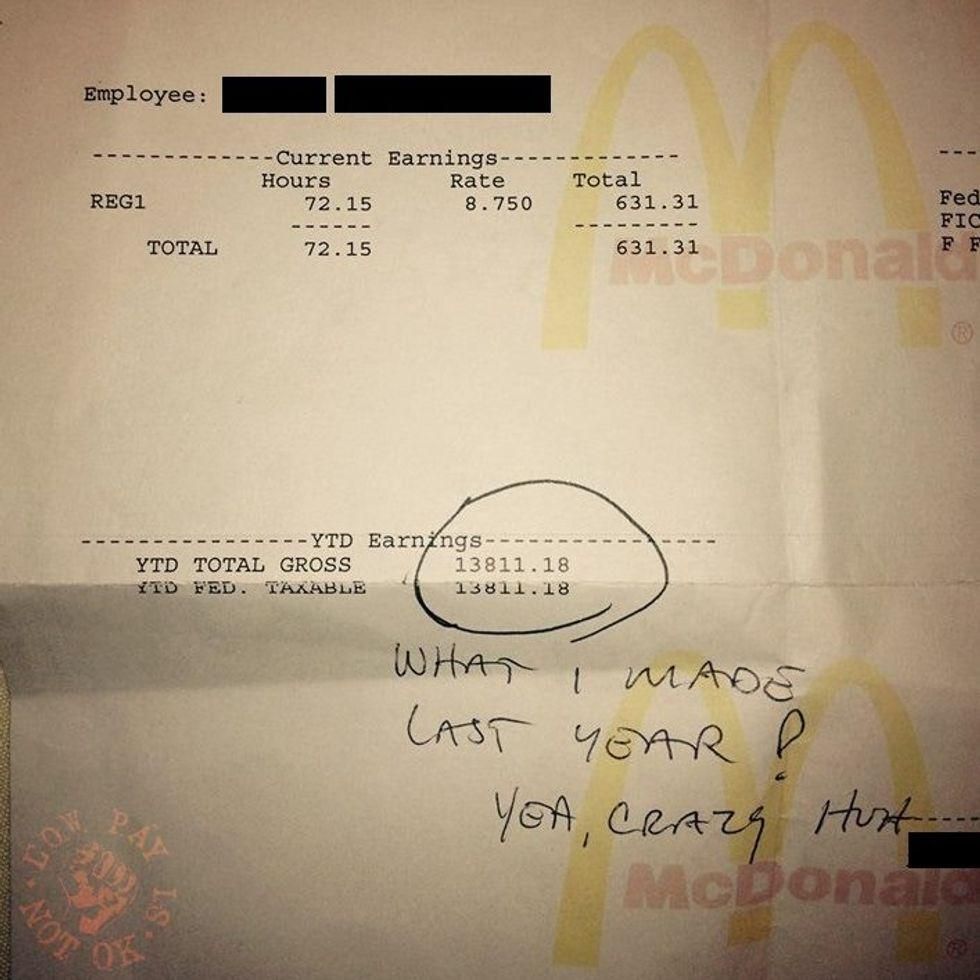Here’s a paycheck for a McDonald’s worker. And here's my jaw dropping to the floor.
So we've all heard the numbers, but what does that mean in reality? Here's one year's wages — yes, *full-time* wages. Woo.
Making a little over 10,000 for a yearly salary.
I've written tons of things about minimum wage, backed up by fact-checkers and economists and scholarly studies. All of them point to raising the minimum wage as a solution to lifting people out of poverty and getting folks off of public assistance. It's slowly happening, and there's much more to be done.
But when it comes right down to it, where the rubber meets the road is what it means for everyday workers who have to live with those wages. I honestly don't know how they do it.
Ask yourself: Could I live on this small of a full-time paycheck? I know what my answer is.
(And note that the minimum wage in many parts of the county is STILL $7.25, so it would be even less than this).
The YouTube channel Just Frugal Me discussed the viral paycheck and noted there's absolutely nothing wrong with working at McDonald's. More than 2 million people in the U.S. alone work for the fast food giant. The worker's paycheck shows they put in 72 hours over the pay period making $8.75 per hour. Before taxes, that's $631 for the week. Just Frugal Me's breakdown is even more eye opening, breaking down this person's pay after taxes and weighed across average rent and utility costs. Spoiler Alert: the total costs for basic necessities far outweighs what this person is making even while working 12 hours per day. But they do make too much to qualify for Medicaid, meaning they will have to go out and buy their own health insurance.
Even in states like California, where the state's $20 minimum wage ensures that people earn nearly three times as much as the federal minimum wage, which remains as low as when this paycheck first made the rounds nearly 10 years ago.
Still, even for a worker that maxed out at 40 hours per week and took zero vacation or sick time, that's only a little over $41,000 per year. That's barely half the median wage in the state of $78,000 and far below a sustainable living wage in cities like Los Angeles.
This story originally appeared ten years ago. It has been updated to reflect new information.
- NFL star Chris Long is donating his entire year's salary to a great cause. ›
- Bartender shares her $9.28 paycheck to remind everyone why tipping is so important - Upworthy ›
- Frustrated mom lives paycheck to paycheck - Upworthy ›
- Why is McDonald's so expensive? - Upworthy ›
- Teen shares joy over getting his first McDonald's paycheck - Upworthy ›
- Woman becomes best friends with McDonald's employee after ordering a Diet Coke - Upworthy ›
- Mailman reveals his massive paycheck to recruit others - Upworthy ›
- Photo of 'sad' McDonald's Play Place goes viral and sparks nostalgia - Upworthy ›
- Gen Z manager praised for the time-off requests she's rejected - Upworthy ›
- Rugged new Old Navy clothes could signal a recession - Upworthy ›
- Teen opens his first paycheck from McDonald's and his reaction is so relatable - Upworthy ›
- This surprising map reveals the real value of $100 in each state - Upworthy ›
- Here’s a paycheck for a McDonald’s employee. And here's my jaw hitting the ground. - Upworthy ›
- Real people share how they stopped living paycheck to paycheck - Upworthy ›
- "We need help": Real mailman shares his huge paycheck to help recruit more postal workers - Upworthy ›

